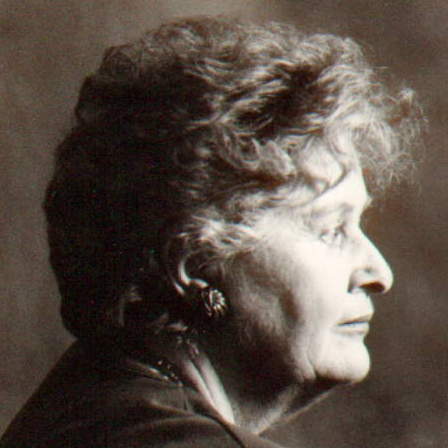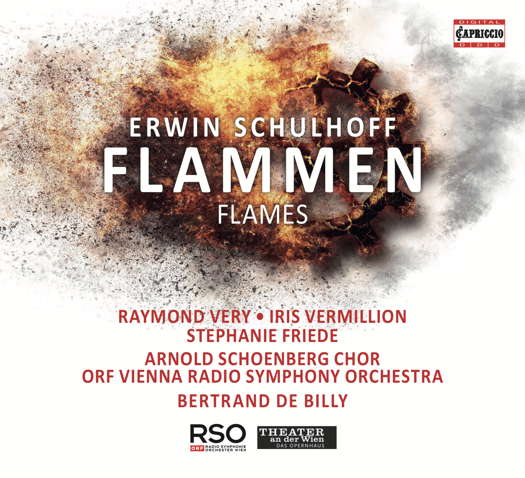 SPONSORED: An Integral Part - Lindsey Wallis looks forward to the Canadian Music Centre's tribute concert to composer Roberta Stephen.
SPONSORED: An Integral Part - Lindsey Wallis looks forward to the Canadian Music Centre's tribute concert to composer Roberta Stephen.
All sponsored features >>
 DISCUSSION: What is a work? John Dante Prevedini leads a discussion about The performing artist as co-creator, including contributions from Halida Dinova, Yekaterina Lebedeva, Béla Hartmann, David Arditti and Stephen Francis Vasta.
DISCUSSION: What is a work? John Dante Prevedini leads a discussion about The performing artist as co-creator, including contributions from Halida Dinova, Yekaterina Lebedeva, Béla Hartmann, David Arditti and Stephen Francis Vasta.
- Bru Zane
- Bernstein: West Side Story
- Johan Botha
- 21st century
- Republic of Côte d'Ivoire
- Philip Sawyers
- Eleanor Chan: Duet: An Artful History of Music
- Paul Carey Jones

Challenging Music
Erwin Schulhoff's only opera, 'Flammen', reviewed by GERALD FENECH
'The performance is exhilarating and the recording sumptuous.'
Born into a German-Jewish family in Prague on 8 June 1894, Erwin Schulhoff was a Czech composer and pianist, and one of the figures in the generation of European musicians whose successful careers were prematurely ended by the rise of the Nazi Regime, and whose works have been rarely noted or performed. Dvořák encouraged the composer's earliest musical studies at the Prague Conservatory when he was ten, and later he studied the piano and composition in Vienna, Liepzig and Cologne where his teachers included, among others, Claude Debussy and Max Reger. When World War I broke out he served on the Russian front where he was wounded, and was in an Italian prisoner-of-war camp when the war ended.
He lived in Germany for a time, but in 1923 he returned to Prague, joining the faculty of the conservatory in 1929. By this time he started to find inspiration in jazz rhythms, and also embraced the avant-garde influence of Dadaism. In the 1930s Schulhoff faced mounting personal and professional adversities. Because of his Jewish descent and his radical politics his works were labelled 'degenerate' and blacklisted by the Nazi Regime. Recitals and performances where he was involved became forbidden territory. His communist sympathies also landed him in hot water in Czechoslovakia. When the Nazis invaded the country in 1939 he had to perform under a pseudonym. In 1941 the Soviet Union granted him citizenship, but before he could leave Czechoslovakia he was arrested and imprisoned. In June 1941 Schulhoff was deported to Wulzburg concentration camp in Bavaria. He died on 18 August 1942 from tuberculosis.
The composing career of this influential musician lasted practicaly all his life and he wrote in all genres, with the exception of sacred music and the operatic, if you ignore, that is, just the one example under review. Indeed, Flammen (Flames) is the only opera composed by Schulhoff. Let's get one thing straight. The subject matter of this stage-work has absolutely no resemblance to the piece of the same title written by Schreker. Flammen is an opera in two acts and ten scenes to a libretto, in Czech, by Karel Josef Benes. The work had its premiere at the National Theatre in Brno on 27 January 1932 under the title Plameny. It was a failure, and the opera had to wait till 1995 for another revival in Leipzig conducted by Udo Zimmermann.
This performance was sung in its German version by Max Brod as Flammen. The story is weird and often disturbing, and is a surrealist retelling of the Don Juan legend with elements from the legend of the Wandering Jew. It is also heavily influenced by Freudian psychology.
Listen — Erwin Schulhoff: Einsam im Haus (Flammen Act I Scene 1)
(CD1 track 1, 0:01-1:01) ℗ 2021 Capriccio :
Unlike the 'Don' in Mozart's masterpiece, the Don Juan is not punished by being dragged down to Hell, but instead is condemned to live forever, and so suffer eternally for his terrible iniquities.
Listen — Erwin Schulhoff: Introduction (Flammen Act II)
(CD2 track 1, 0:20-1:20) ℗ 2021 Capriccio :
Indeed, Schulhoff's detailed stage directions called for sets with an all pervading darkness, punctuated by revealing shafts of light and colour, and the scenography is echoed by a chorus of shadows (representing the six female characters), whose commentary makes frequent use of verbal images of colour and light.
Listen — Erwin Schulhoff: Nie! Tod sitzt in meinem Gesicht (Flammen Act II Scene 9)
(CD2 track 7, 2:02-3:01) ℗ 2021 Capriccio :
Challenging music that yields its riches on repeated listening. The performance is exhilarating and the recording sumptuous.
Copyright © 30 May 2021
Gerald Fenech,
Gzira, Malta

CD INFORMATION - ERWIN SCHULHOFF: FLAMMEN


